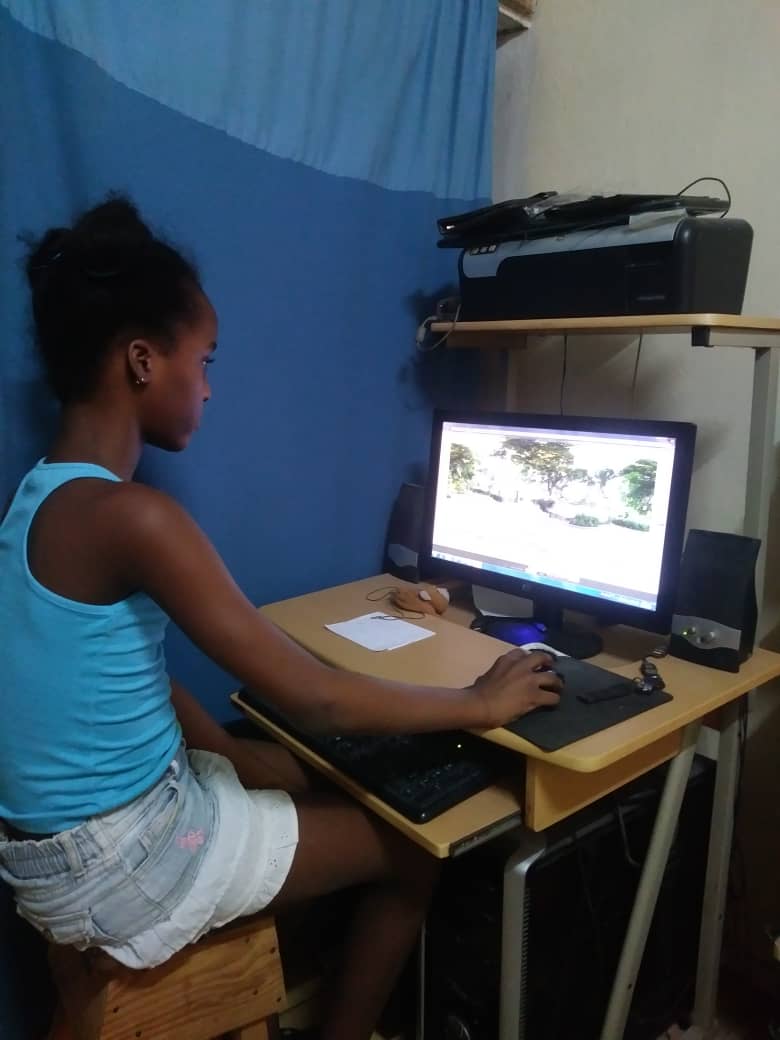
The group of children behind the project “the Children of the Internet” from Santiago de Cuba gathered together in a workshop in October 2020 to brainstorm ideas to address poverty in their communities. They formulated several ideas and finally decided to support children that were suffering disproportionately from lack of educational materials especially digital gadgets and internet in the time of the COVID-19 pandemic. They chose this idea due to the real need children were experiencing, which had been exacerbated by the pandemic and which had drastically shifted learning from physical classrooms to digital spaces. By providing educational information that they could collect online, the children behind the project wanted to support others with limited technological access.
The children leading the project were so enthusiastic about the project, that they began the execution even with limited financial resources. They cleverly named the project ‘children of the internet’ while brainstorming on how to structure the actions of the project. The children began the first phase of the project by identifying and visiting socially disadvantaged children. They researched and decided upon the materials and they created informative educational folders which they then delivered to the beneficiaries to support with their education.
“We have helped the children, we have studied with them and I have, with the help of my parents, downloaded the online classes and some materials like multiplication tables, tales, riddles, tongue twisters and many more. And we also could download them didactic books so they have fun at the same time they learn.” – Ana Isabela, ‘children of the internet’
The children planned all the different phases of the project starting from identifying the beneficiaries and the informative needs to the systematic search for the information materials online, designing and producing the informative folders and finally the closing and evaluation of the project. The project supported all together 30 children between 7 to 16 years.
“I like the materials provided; they are very interesting. They will help me with my classes.” – Patricia, a child beneficiary of the project
 The children faced many challenges along the way and they had to modify their original plans due to the COVID-19 pandemic. Other challenges were posed by the poor internet connection, the material deficiencies in Cuba as well as some of the adult’s attitudes towards the children being in lead and taking agency in such a project. However, the children found alternatives and solutions to these challenges, by ensuring all the necessary protection measures were taken into account, conducting meetings in small groups and open spaces and by establishing WhatsApp groups for communication with the other children. The children were also constantly searching for state and private resources and the most appropriate prices and using the internet in the hours of easier connectivity. They were also actively seeking to form new alliances with parents and grandparents to gain continuous support to the project and to establish respect for the ideas of children and other project collaborators.
The children faced many challenges along the way and they had to modify their original plans due to the COVID-19 pandemic. Other challenges were posed by the poor internet connection, the material deficiencies in Cuba as well as some of the adult’s attitudes towards the children being in lead and taking agency in such a project. However, the children found alternatives and solutions to these challenges, by ensuring all the necessary protection measures were taken into account, conducting meetings in small groups and open spaces and by establishing WhatsApp groups for communication with the other children. The children were also constantly searching for state and private resources and the most appropriate prices and using the internet in the hours of easier connectivity. They were also actively seeking to form new alliances with parents and grandparents to gain continuous support to the project and to establish respect for the ideas of children and other project collaborators.
“This has been a great experience for everyone! We have had many activities with children who don’t have access to internet. Almost everyone has pretty, colored folders and all that they include can support them with their school. We can create so many things with our own imagination!” – Ana Isabela, a child from the implementing team, Children of the Internet
Various adults of Centro Lavastida, as well as parents and grandparents worked in collaboration with the children in supporting roles, for example assisting with the visits to the beneficiaries and in searching for information. Maite from Centro Lavastida highlighted the importance of preparing various alternatives for the execution of activities and providing parents more knowledge and guidance on the rights of children and how to promote their real and effective participation. Boys and girls need spiritual accompaniment beyond the usual and it is necessary to offer resilient resources to children during crises and health emergencies. Maite also saw it important to provide spaces for children to identify themselves the ways in which they can contribute to reducing poverty.
“Working with children is very enriching and rewarding. It is important not to stop fighting because your rights are respected. Tracing strategies to protect and help especially those children who live in situations of vulnerability and poverty should be a constant work, it is a call from our faith and our commitment to God.” – Maite, Supporting adult, Centro Lavastida
This project is part of the Children’s Solutions Lab programme, inaugurated in 2020 by Arigatou international through its initiatives; End Child poverty and Ethics Education for Children. The Children’s Solutions Lab aims to create meaningful spaces for children to address poverty through solutions focused on education. This project was one of the five finalists from 37 submissions received from children’s groups around the world.